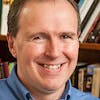No, We're Not God
When the Journal of Medical Ethics released the article, “What makes killing wrong?” in January, they set off a mini-storm of outrage and controversy. The authors, from Duke University and the National Institutes of Health, asserted that ‘universally and irreversibly disabled people’ could be killed for the sake of retrieving their organs for people who are not totally disabled.
On the whole, the issue raised is when it becomes appropriate to retrieve organs from one person for the sake of another. The governing rule that a person must be dead before vital organs can be removed, known as the ‘dead donor rule,’ has many difficult aspects to it that make even its proponents uncomfortable.
But a dry journal article on the philosophical and ethical issues around such an issue would not have been interesting.
So, these authors created a provocative scenario involving a poor crime victim named Betty who becomes ‘universally and irreversibly disabled.’ They argue that her condition is equal to (or possibly worse then) being dead. Thus, it does not harm her to kill her and take her organs.
A Larger Issue
If they were trying to solicit outrage they succeeded. Too many of us took the bait and responded rashly, calling the authors evil, misguided, immoral. While they may be all of those things, there is a larger issue in the article that changes the way we think about this and any other issue related to human life and disability.
The larger issue is simply a matter of who is in control. The authors conclude that "we" are. But you might ask, "who is we?" Answer: the strong, the capable, the wise, the educated. The article attempts to subtly draw everyone into this presumption of human control.
The logical fallacies that abound in their article are too numerous to address and ultimately distracting from that core issue of control. The idea of God or religion having authority is dismissed in a single sentence: “However, these arguments have no force at all for those of us who prefer our moral theories to be independent of religion.”
From this standpoint, how can they lose? They are not governed by any authority except their own. Further, they also get to govern anyone who disagrees with them because our appeals to a different authority have been rejected.
Drawing a New Line?
The whole article could be considered absurd and not worth the time to read, except for their closing assertions about organ donations and people with disabilities:
Critics might object that abandoning the dead donor rule will take us down the slippery slope to procuring vital organs from the mentally retarded or other groups of vulnerable individuals with disabilities. Absolutely not. We can hold the line for vital organ donation by continuing to restrict it to those in a state of total (universal and irreversible) disability. It is only these donors who would not be harmed or wronged by vital organ donation, since all other donors have abilities to lose.
In other words, they assert that the "we" who have created the artificial line between worthy life and unworthy life can also be trusted never to move that line. The very fact that they have created a new line proves how illogical and disingenuousness the very statement is.
Only God Is God
Have we learned nothing from history? Once we hand over authority on such basic matters as what constitutes life and its value, we should not be surprised when the line moves for the ‘good’ of others. Eugenics, the Holocaust, abortion — and it could get worse.
End-of-life issues are horribly complex and emotionally devastating. But we shouldn't confuse that issue with what these authors have raised. We also shouldn't begin to assume that end-of-life issues are the same as the issues related to living with disabilities.
Ultimately, the authors of the article are trying to be God. They're attempting to assert an independent authority over life. But worse, it's a high-handed takeover of lives that are weaker than their own. They want us to believe we have that authority as well.
Let us remember — and then winsomely remind others — that God alone has such authority over his creation. And that we will not let the vulnerable among us be abused, no matter what title the oppressor carries, nor how many times they'd tell us it is for our 'good.'



